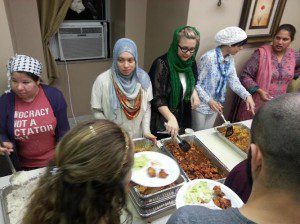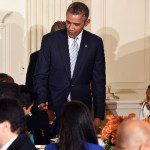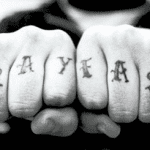This article comes on Day 18 of our special Altmuslim/Patheos Muslim Ramadan #30Days30Writers blog project, in which we are showcasing the voices of 30 Muslim leaders, activists, scholars, writers, youth and more (one on each day of Ramadan) as part of our commitment to own our own narratives and show how we are one Ummah, many voices. To demonstrate how our Ramadan experiences are shared yet unique to each of us.
The notion of community is one of the most frequently discussed ideas among Muslims in the U.S. A few months ago, I attended the American Learning Institute for Muslims (ALIM) weekend program in Chicago. Dr. Sherman Jackson asked the participants to reflect on this term.
What do we mean by “community?” Are we talking about the broad “Ummah,” the 1.6 billion-plus Muslims around the world? Or our ethnic enclaves, the mosques we attend, the social circles we find ourselves in? Do we separate ourselves into categories based on racial hierarchies? Class? Gender? These are questions we need to be asking during Ramadan, a time when community becomes everything.
For many, Ramadan means sharing meals with ones’ family, or at the local mosque. But not everyone has the luxury of standard or traditional communities like the “local mosque” or one’s family. This is where the idea of the “Third Space” comes in.
The “Third Space” was first discussed by social theorist Homi K. Bhabha in the post-colonial context. Bhabha describes it as:
- That space where the oppressed plot their liberation: the whispering corners of the tavern or the bazaar
- That space where oppressed and oppressor are able to come together, free (maybe only momentarily) of oppression itself, embodied in their particularity.
In its more everyday-usage, Third Spaces can be seen as:
- One space in the domestic sphere (the family and the home); a second space is the sphere of civic engagement (including school, work and other forms of public participation); and a “Third Space” where individual, sometimes professional, and sometimes transgressive acts are played out: where people let their “real” selves show.
For new Muslims, it is crucial to tap into a new community, to feel a sense of belonging and to gain knowledge of the deen. Luckily, there are several programs throughout the country — some in individual mosques, others in various institutions whose sole purpose is to support new and returning Muslims. The most well-known institution nationwide might be the Ta’aleef Collective, headquartered in Fremont, California, just outside San Francisco. Usama Canon, its founder, comes to Chicago at least once a month — sometimes more — to teach classes, give khutbas at the Inner-City Muslim Action Network (IMAN) and host social and spiritual events such as mawlids, iftars and workshops.
Ta’aleef Chicago has a strong group of volunteers who provide care for converts. They also host social events and classes such as
- the basics of prayer
- Islam 101 for families and friends of reverts
- a class taught by Dr. Umar Faruq Abd-Allah on Imam Al-Ghazali
- Usama Canon’s class on Imam Hadad’s Book of Assistance
- and many guest classes and lectures.
IMAN is another “Third Space” we are blessed to have in Chicago. Based in the Chicago Lawn neighborhood on Chicago’s Southside, IMAN was recently named the #1 most Affordable Health Clinic in the city by Chicago Reader magazine. According to the Reader, “A medical director, a nurse practitioner, a lab tech, and a rotating roster of volunteer doctors, nurses, and medical students provide treatment for 85 patients a week—free for those eligible for charity care.”
IMAN also provides fresh produce and try to encourage the typical “Food and Liquor” stores on the South and West Sides to offer healthy alternatives to the alcohol and unhealthy foods available to the community.
I’ve been attending the weekly “Ramadan Reflection” with< Ustadh Ubaydallah Evans at IMAN. It consists of a two-hour talk by Evans, followed by a group activity and reflection and finally, praying Maghreb and breaking fast as a community. I feel blessed to be among such passionate activists, artists and organizers, in addition to the dozens of students, parents and children who attend IMAN’s regular events.
Not all Third Spaces are official institutions or non-profits — as many Muslims in the U.S. find ourselves not fitting in to one particular community or identity. Third Spaces may also be neighborhood community centers, or our friends’ apartments, where we sit down for iftaar or suhoor during this blessed Ramadan.
For some of us, Third Spaces blend in with the First or Second Spaces (home, work or school). Many young Muslims find solace in their universities’ MSAs, which provide a community for students while they study. Others find community in their workplaces. I am lucky enough to work at a chapter of the country’s largest Muslim civil rights organization, CAIR (Chicago). Every day I walk into an office bustling with a diverse group of interns, lawyers and law clerks working on hundreds of cases ranging from asylum to workplace discrimination to mosque zoning.
This Ramadan, I’m taking time to say Alhamdullilah for all the wonderful, hardworking people behind these important institutions. For me, Ta’aleef is a place I go for spiritual recharging, to gather with friends, and appreciate the gift of Allah (swt)’s love. IMAN keeps communities in good health, out of hunger, and elevates the arts and creative minds of young people-all within an Islamic framework. And CAIR keeps our communities safe and protects us from the many threats and harms we face as Muslims in the US everyday- whether it be government surveillance, vandalism and violence towards our places of worship or harassment and spying from law enforcement
Please remember to keep these institutions and the hardworking staff, volunteers and community members in your duas. May we always be spiritually replenished, in good health- and safe. Ameen.
Agnieszka Karoluk is the Senior Communications Coordinator at the Council on American Islamic Relations (CAIR) Chicago and the Editor at the Chicago Monitor. Follow her on Twitter @huliganjetta48













